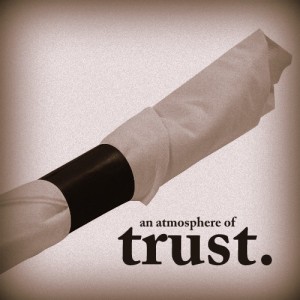 We sat down to dinner at one of those fancy places where your silverware isn’t plastic and it comes wrapped in a napkin and one of those paper rings. When I was a kid, we’d turn them into finger puppets and tell stories across the table until our food came.
We sat down to dinner at one of those fancy places where your silverware isn’t plastic and it comes wrapped in a napkin and one of those paper rings. When I was a kid, we’d turn them into finger puppets and tell stories across the table until our food came.
This time, each of the paper rings at our table had a hand-written letter—an initial—inside. One had the letter B, another an M or W, and a couple with someone’s scribble.
“What were the letters for?” we asked our server, who, until now had been smiling and seemed happy to serve us. Immediately her shoulders dropped and her voice hushed.
“Sometimes I hate working here,” she said. “At the end of our shift we have to wrap 40 sets of silverware, plus the number of tables we served.” It didn’t seem so unreasonable to me. She continued, “But we’re not allowed to share or help each other. They’re afraid we’re going to cheat.”
“They don’t trust us.” She set our drinks down on the table, two waters with lemon and two Cokes, and moved on to another table.
My mind was racing. I started to ask questions. I wondered if the managers realize the impact this is having on their employees. Were the servers really cheating on their silverware responsibilities? There must be bigger problems, I thought.
Then it hit me.
I have silverware too. This wasn’t about the servers at Logan’s Roadhouse. It was about me, and my family, and my team. Am I helping to create an environment that fosters joyful service and success? Or am I fostering mistrust, exasperating those around me with unreasonable expectations?
Here are three things that can help create an atmosphere of trust at work and at home.
Let people work together. I was shocked to hear that after a long shift, Melissa couldn’t help Brenda wrap her silverware. Cheating? Really? When I was growing up we called it cooperation. A little competition can be good, but at the end of the day, sometimes rolling someone else’s silverware is the best possible thing.
Value one another. There was a reason our server’s shoulders dropped when we asked her about the paper rings. She felt defeated, unimportant, undervalued. To her employers, she wasn’t a person with a name to be thanked, she was an initial on a paper to be counted. Count, check, you can go home now. Instead, look for ways to honor the faithful, loyal service of those around you. Say thank you.
Welcome dialogue. It came at a whisper, but I’m sure she wanted to yell it—that the whole thing was dumb. She thought she needed this job more than she needed to be able to voice her thoughts on the matter. But it had clearly eroded her respect for her managers. She was happy to serve us—she seemed to enjoy it, even—but it seemed her other responsibilities were just that.
When you give those around you the opportunity to speak into situations, processes, and systems, when you give them a voice, you also gain their joyful service.
We got the best service that day that I’ve had in a while. It wasn’t because of the initial on our silverware ring, it was because of our server. During that dinner, we were on her side—and can’t we all be? On the same team as our colleagues, coworkers and staff. On the same side as our spouses and kids.
We can be working together, valuing one another, and communicating freely in an atmosphere of trust.
Hmmm. Good points, but it’s too bad they came at the expense of the company’s reputation that she works for. Bad managers can give good companies bad names, but so can employees who air their dirty laundry to customers. Just sayin………..
Joe, it’s true… and I thought twice about posting the name of the restaurant in the blog. Ultimately, I want to create a working environment where our staff can’t help but speak positively about our organization.